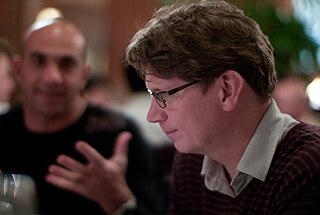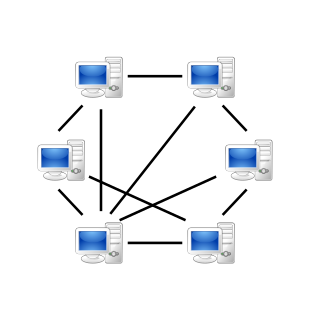
Peer-to-peer (P2P) computing or networking is a distributed application architecture that partitions tasks or workloads between peers. Peers are equally privileged, equipotent participants in the application. They are said to form a peer-to-peer network of nodes.

Venice is a residential, commercial, and recreational beachfront neighborhood within Los Angeles, California. It is located within the urban region of western Los Angeles County known as the Westside.

Venice is a city in northeastern Italy and the capital of the Veneto region. It is situated on a group of 118 small islands that are separated by canals and linked by over 400 bridges. The islands are located in the shallow Venetian Lagoon, an enclosed bay that lies between the mouths of the Po and the Piave rivers. In 2018, 260,897 people resided in the Comune di Venezia, of whom around 55,000 live in the historical city of Venice. Together with Padua and Treviso, the city is included in the Padua-Treviso-Venice Metropolitan Area (PATREVE), which is considered a statistical metropolitan area, with a total population of 2.6 million.

The Merchant of Venice is a 16th-century play written by William Shakespeare in which a merchant in Venice (Antonio) must default on a large loan provided by a Jewish moneylender, Shylock. It is believed to have been written between 1596 and 1599. Though classified as a comedy in the First Folio and sharing certain aspects with Shakespeare's other romantic comedies, the play is most remembered for its dramatic scenes, and it is best known for Shylock and the famous "Hath not a Jew eyes?" speech on humanity. Also notable is Portia's speech about "the quality of mercy". Critic Harold Bloom listed it among Shakespeare's great comedies.
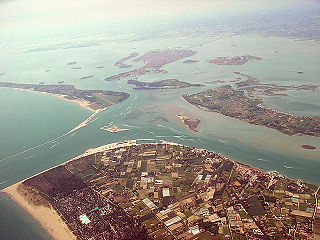
The Venetian Lagoon is an enclosed bay of the Adriatic Sea, in northern Italy, in which the city of Venice is situated. Its name in the Italian and Venetian languages, Laguna Veneta—cognate of Latin lacus, "lake"—has provided the english name for an enclosed, shallow embayment of salt water, a lagoon.
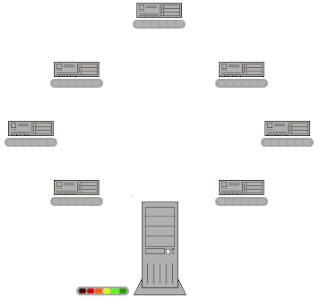
BitTorrent is a communication protocol for peer-to-peer file sharing (P2P) which is used to distribute data and electronic files over the Internet.

The gondola is a traditional, flat-bottomed Venetian rowing boat, well suited to the conditions of the Venetian lagoon. It is similar to a canoe, except it is narrower. It is propelled by a gondolier, who uses a rowing oar, which is not fastened to the hull, in a sculling manner and acts as the rudder.

Vincenzo Scamozzi was an Italian architect and a writer on architecture, active mainly in Vicenza and Republic of Venice area in the second half of the 16th century. He was perhaps the most important figure there between Andrea Palladio, whose unfinished projects he inherited at Palladio's death in 1580, and Baldassarre Longhena, Scamozzi's only pupil.

The Republic of Venice or Venetian Republic, traditionally known as La Serenissima was a sovereign state and maritime republic in northeastern Italy, which existed for over a millennium between the 7th century and the 18th century from 697 AD until 1797 AD. It was based in the lagoon communities of the historically prosperous city of Venice, and was a leading European economic and trading power during the Middle Ages and the Renaissance.
Commons-based peer production (CBPP) is a term coined by Harvard Law School professor Yochai Benkler. It describes a new model of socioeconomic production in which large numbers of people work cooperatively. Commons-based projects generally have less rigid hierarchical structures than those under more traditional business models. Often—but not always—commons-based projects are designed without a need for financial compensation for contributors. For example, sharing of STL design files for objects freely on the internet enables anyone with a 3-D printer to digitally replicate the object saving the prosumer significant money.
Social peer-to-peer processes are interactions with a peer-to-peer dynamic. These peers can be humans or computers. Peer-to-peer (P2P) is a term that originated from the popular concept of the P2P distributed computer application architecture which partitions tasks or workloads between peers. This application structure was popularized by file sharing systems like Napster, the first of its kind in the late 1990s.

The Carnival of Venice is an annual festival held in Venice, Italy. The Carnival ends with the Christian celebration of Lent, forty days before Easter, on Shrove Tuesday, the day before Ash Wednesday. The festival is world-famous for its elaborate masks.
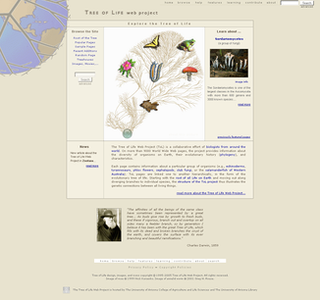
The Tree of Life Web Project is an Internet project providing information about the diversity and phylogeny of life on Earth.
Colin George was a Welsh actor and director, born in Pembroke Dock, Pembrokeshire, Wales. He is known for his many roles in numerous theatre productions as well as the founder of the Crucible Theatre in Sheffield.

The Venice Canal Historic District is a district in the Venice section of Los Angeles, California. The district is noteworthy for its man-made canals built in 1905 by developer Abbot Kinney as part of his Venice of America plan. Kinney sought to recreate the appearance and feel of Venice, Italy, in Southern California.
Freenode, formerly known as Open Projects Network, is an IRC network used to discuss peer-directed projects. Their servers are all accessible from the host names chat.freenode.net and irc.freenode.net, which load balances connections by using the actual servers in rotation. In 2010, it became the largest free and open source software-focused IRC network and, as of 2013, the largest IRC network, regardless of focus, encompassing more than 90,000 users and 40,000 channels, gaining almost 5,000 new users per year.

Nupedia was an English-language web-based encyclopedia whose articles were written by volunteer contributors with appropriate subject matter expertise, reviewed by expert editors before publication, and licensed as free content. It was founded by Jimmy Wales and underwritten by Bomis, with Larry Sanger as editor-in-chief. Nupedia lasted from October 1999 until September 2003. It is mostly known now as the predecessor of Wikipedia, but Nupedia had a seven-step approval process to control content of articles before being posted, rather than live wiki-based updating. Nupedia was designed by committee, with experts to predefine the rules, and it approved only 21 articles in its first year, compared to Wikipedia posting 200 articles in the first month, and 18,000 in the first year. Unlike Wikipedia, Nupedia was not a wiki; it was instead characterized by an extensive peer-review process, designed to make its articles of a quality comparable to that of professional encyclopedias. Nupedia wanted scholars to volunteer content. Before it ceased operating, Nupedia produced 25 approved articles that had completed its review process, and 150 more articles were in progress. Jimmy Wales preferred Wikipedia's easier posting of articles, while Larry Sanger preferred the peer-reviewed approach used by Nupedia and later founded Citizendium in 2006 as an expert reviewed alternative to Wikipedia.
Berengo Studio is one of the glassmaking and glass art companies based in Murano, Venice (Italy).
Open source is a term denoting that a product includes permission to use its source code, design documents, or content. It most commonly refers to the open-source model, in which open-source software or other products are released under an open-source license as part of the open-source-software movement. Use of the term originated with software, but has expanded beyond the software sector to cover other open content and forms of open collaboration.

